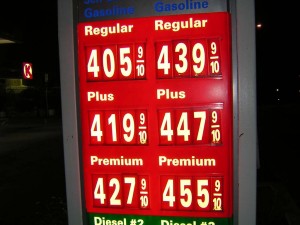Gasoline prices, now pushing upwards towards and beyond $4 per gallon in most of the U.S., will remain volatile for the foreseeable future while trending upwards, predicts Peter Wells, an analyst with Boston Petroleum.
Even if the U.S succeeded in pumping up its supplies of domestic crude oil, Americans will still have to depend on imported oil to fill their demand for transportation fuel, Wells said during a panel discussion at Toyota’s annual seminar on Sustainable Mobility. In addition, prices for petroleum products are set on a global level.
The recent upheavals in Egypt, Libya, Tunisia, Yemen and Bahrain only underscore the volatility in the Middle East, which is fueled by a whole generation of what Wells described as angry young men and the divide between Shiite and Sunni Muslims, which increasingly contributes to the instability of the region.
Wells noted the upheavals in the Middle East also have cut or reduced the region’s spare or swing capacity, which is already concentrated in handful of countries such as Iran, Libya, Nigeria, Iraq, Venezuela and Saudi Arabia, and is vital to the calculations of the global oil markets.
Libya has already been knocked out, at least for the time being, which has sent oil prices soaring, in recent weeks, while Nigeria’s output has been degraded by a long-running guerrilla war, Wells noted.
“Whenever spare capacity drops between 4 and 5 million barrels per day, the market gets very nervous,” which is exactly what has happened in recent weeks, sending prices for gasoline has moved upwards, Wells said.
Meanwhile, it is also easy to foresee a situation where the only spare capacity in world oil markets, by the end of the decade, will be located in Iraq and Saudi Arabia. Both countries are relatively stable now but face problematic futures given the nature of the Sunni-Shite religious divide in both countries.
As if the situation wasn’t problematic enough, demand for oil from the Middle East is steadily increasing from emerging economies such as China and India.
The combination of rising demand and falling production will make any oil increasingly expensive on global markets by the year 2030, Wels warned.
Wells also said that while efforts are well under way to try and replace petroleum as a motor fuel, some initiatives, such as the wider use of ethanol, are simply ill-conceived. Ethanol production is unlikely to make any real contribution to eliminating the growing imbalance between supply and demand in the market for motor fuels.
Improvements in the technology of internal combustion engines and the introduction of electric vehicles and hybrids will help, the analyst forecast. The problem is that it has always been extremely difficult to plan in advance for disruption in the petroleum markets.
“No single forecast has been able to capture the disruption,” he said. Instead they always catch markets by surprise, leaving motorists and other consumers in the lurch and struggling with suddenly higher prices.

